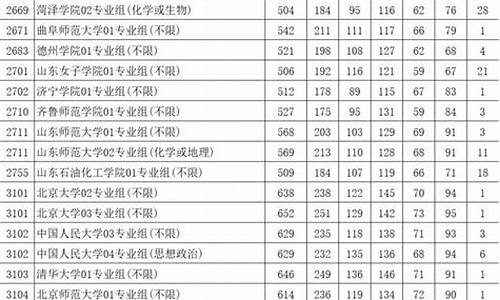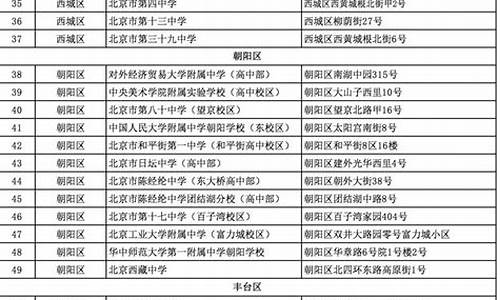您现在的位置是: 首页 > 教育资讯 教育资讯
高考英语语法大全_高考英语语法大全汇总
tamoadmin 2024-07-28 人已围观
简介1.高考英语语法:高中英语语法-实用英语五十句2.高考英语13个语法考点3.高考英语语法: 独立主格结构的七种形式4.高考英语语法主要考哪些5.动词的语态英语基础语法知识点汇总高考英语语法(全民尊享版)链接:?s://pan.baidu/s/1rOIToJspmgYvu3cZ0OoFrA?提取码:?m9qd?复制这段内容后打开百度网盘手机App,操作更方便哦?若有问题,欢迎追问~高考英语语法:高中
1.高考英语语法:高中英语语法-实用英语五十句
2.高考英语13个语法考点
3.高考英语语法: 独立主格结构的七种形式
4.高考英语语法主要考哪些
5.动词的语态英语基础语法知识点汇总

高考英语语法(全民尊享版)
链接:?s://pan.baidu/s/1rOIToJspmgYvu3cZ0OoFrA
?提取码:?m9qd?复制这段内容后打开百度网盘手机App,操作更方便哦?若有问题,欢迎追问~
高考英语语法:高中英语语法-实用英语五十句
一、~~~ the + ~ est + 名词 + (that) + 主词 + he ever + seen (known/heard/had/read, etc)
~~~ the most + 形容词 + 名词 + (that) + 主词 + he ever + seen (known/heard/had/read, etc)
例句:Helen is the most beautiful girl that I he ever seen.
海伦是我所看过最美丽的女孩。
Mr. Chang is the kindest teacher that I he ever had.
张老师是我曾经遇到最仁慈的教师。
二、Nothing is + ~~~ er than to + V
Nothing is + more + 形容词 + than to + V
例句:Nothing is more important than to receive education.
没有比接受教育更重要的事。
三、 ~~ cannot emphasize the importance of ~~~ too much.
(再怎么强调...的重要性也不为过。)
例句:We cannot emphasize the importance of protecting our eyes too much.
我们再怎么强调保护眼睛的重要性也不为过。
四、There is no denying that + S + V ...(不可否认的...)
例句:There is no denying that the qualities of our living he gone from bad to worse.
不可否认的,我们的生活品质已经每况愈下。
五、It is universally acknowledged that + 句子~~ (全世界都知道...)
例句:It is universally acknowledged that trees are indispensable to us.
全世界都知道树木对我们是不可或缺的。
六、There is no dou that + 句子~~ (毫无疑问的...)
例句:There is no dou that our educational system lees something to be desired.
毫无疑问的我们的教育制度令人不满意。
七、An advantage of ~~~ is that + 句子 (...的优点是...)
例句:An advantage of using the solar energy is that it won‘t create (produce) any pollution.
使用太阳能的优点是它不会制造任何污染。
八、The reason why + 句子 ~~~ is that + 句子 (...的原因是...)
例句:The reason why we he to grow trees is that they can provide us with fresh air.
The reason why we he to grow trees is that they can supply fresh air for us.
我们必须种树的原因是它们能供应我们新鲜的空气。
九、So + 形容词 + be + 主词 + that + 句子 (如此...以致于...)
例句:So precious is time that we can‘t afford to waste it.
时间是如此珍贵,我们经不起浪费它。
十、Adj + as + Subject(主词)+ be, S + V~~~ (虽然...)
例句:Rich as our country is, the qualities of our living are by no means satisfactory.
{by no means = in no way = on no account 一点也不}
虽然我们的国家富有,我们的生活品质绝对令人不满意。
十一、The + ~er + S + V, ~~~ the + ~er + S + V ~~~
The + more + Adj + S + V, ~~~ the + more + Adj + S + V
~~~(愈...愈...)
例句:The harder you work, the more progress you make.
你愈努力,你愈进步。
The more books we read, the more learned we become.
我们书读愈多,我们愈有学问。
十二、By +Ving, ~~ can ~~ (借着...,..能够..)
例句:By taking exercise, we can always stay healthy.
借着做运动,我们能够始终保持健康。
十三、 ~~ enable + Object(受词)+ to + V (..使..能够..)
例句:Listening to music enable us to feel relaxed.
听音乐使我们能够感觉轻松。
十四、On no account can we + V ~~~ (我们绝对不能...)
例句:On no account can we ignore the value of knowledge.
高考英语13个语法考点
《高中英语语法-实用英语五十句》由英语我整理,更多请访问:s://.liuxue86/english/。本内容整理时间为05月12日,如有任何问题请联系我们。
实用英语五十句
支持别人的十句话
1. I will support you.
我会支持你的。
2. I"ll back you up.
我会挺你的。
3. I"m on your side.
我站在你这边。
4. You can count on me.
你可以依靠我。
5. You can rely on me.
你可以依赖我。
6. You can trust in me.
你可以信赖我。
7. I"ll be ailable if you need me.
你需要帮助时,我就有空。
8. I"ll be there if you need a hand.
你需要帮助时,我就会出现。
9. I"m a phone call away.
我随call随到。
10. I"m with you all the way.
我一路上陪着你。
命令别人的十句话
1. Do as I tell you.
照我的话做。
2. Don"t question what I say.
别质疑我的话。
3. Do what you are told.
叫你怎么做,你就怎么做。
4. Do as I say, and you"ll be just fine.
照我的话做就没错了。
5. Shut your mouth and do it.
闭嘴照做。
6. Just do it.
做就是了。
7. You"d better take me seriously.
你最好把我的话当真。
8. Don"t ever disobey me.
别想违背我。
9. My way or the high way.
照我的方式做,不然就滚蛋。
10. Listen, I"m the one who calls the shots here.
听好,这里由我做主。
追求异性的十句话
1. You"ve given me a reason to live.
你给了我活下去的理由。
2. I"m drawn to you.
我被你吸引。
3. I"m so hy I met you.
真高兴能认识你。
4. You"re a knockout.
你美(帅)呆了。
5. I"m mad about you.
我为你疯狂。
6. I fell in love with you the moment I saw you.
见到你的那一瞬间,我就爱上你了。
7. You fill my life with joy.
你使我的生命充满喜悦。
8. I want to be with you for the rest of my life.
我要和你共度余生。
9. I didn"t stop thinking about you all day.
我整天都在想你。
10. You complete me.
你使我的生命更完整。
「与老外搭讪」的十句话
1. Where are you from?
你从哪里来?
2. How long he you been in Taiwan?
你来台湾多久了?
3. Do you speak Chinese?
你会说中文吗?
4. Wow, where did you pick up your Chinese? You speak Chinese so well!
哇,你在哪里学的中文?你中文讲得好棒喔!
5. Why did you come to Taiwan? Did you come here to study Chinese or just
visit?
你为什么来台湾?你来台湾学中文还是只是观光?
6. What do you do in Taiwan?
你在台湾从事什么工作?
7. Do you like Chinese food?
你喜欢中国食物吗?
8. Are you interested in doing a language exchange with me?
你有兴趣和我做个语言交换吗?
9. What do you like about Taiwan?
你喜欢台湾哪些东西?
10. Where he you been in Taiwan?
你去过台湾哪些地方?
形容「身材」的十句话
1. She is thin / fat.
她瘦瘦的。 / 她胖胖的。
2. He"s big / small.
他个头满大的。/ 他个头小小的。
3. She"s slim.
她很苗条。
4. She"s really skinny.
她瘦得跟皮包骨一样。
5. She is chubby.
她胖嘟嘟的。
6. He has a beer belly.
他有啤酒肚。
7. He"s got a spare tire. / He"s got love handles.
他有游泳圈。(他腰部都是赘肉。)
8. He"s very muscular.
他肌肉很发达。
9. She has an hourglass figure. / She"s got a curvy figure.
她的身材玲珑有致。/ 她曲线玲珑。
10. She"s pretty stacked.
她身材身材婀娜多姿 《高中英语语法-实用英语五十句》由英语我整理,更多请访问:s://.liuxue86/english/
高考英语语法: 独立主格结构的七种形式
她是一个如此的一个笨蛋以致相信了他所说的话。
(4) so + adj./adv. + as to do sth 如此……以致于……
例:He was so strong as to carry the hey box.
她是一个如此的一个笨蛋以致相信了他所说的话。
(4) so + adj./adv. + as to do sth 如此……以致于……
例:He was so strong as to carry the hey box.
她是一个如此的一个笨蛋以致相信了他所说的话。
(4) so + adj./adv. + as to do sth 如此……以致于……
例:He was so strong as to carry the hey box.
高考英语语法主要考哪些
高考英语语法:独立主格结构的七种形式
1. 名词(代词)+现在分词
The question being settled, we went home. 问题解决之后,我们就回家了。
We shall play the match tomorrow, weather permitting. 明天设天气好,我们就进行比赛。
The monitor being ill, we’d better put the meeting off. 班长病了,我们还是延期开会吧。
2. 名词(代词)+过去分词
The job finished, we went home. 工作结束后我们就回家了。
The last bus hing gone, we had to walk home. 最后一班公车已经走了,我们必须走路回家。
More time given, we should he done the job much better. 如果给我们更多的时间,我们会把工作做得更好。
3. 名词(代词)+不定式
Nobody to come tomorrow, we will he to put off the meeting till next week. 如果明天没有人来,我们将把会议推迟到下周。
So many people to help him, he is sure to succeed. 有如此多的人来帮助他,他一定会成功的。
4. 名词(代词)+介词短语
The soldiers dashed in, rifle in hand. 士兵们端着枪冲了进来。
A girl came in, book in hand. 一个少女进来了,手里拿着书。
He was waiting, his eyes on her back. 他在等着,眼睛望着她的背影。
5. 名词(代词)+形容词或副词
He sat in the front row, his mouth half open. 他坐在前排,嘴半开着。
She sat at the table, collar off, head down, and pen in position, ready to begin the long letter. 她坐在桌前,衣领已解掉,头低了下来,拿好钢笔,准备开始写一封长信。
6. There being +名词(代词)
There being nothing else to do, we went home. 没有别的事可做,我们就回家了。
There being no further business, I declare the meeting closed. 没有再要讨论的事了,我宣布散会。
7. It being +名词(代词)
It being Christmas, the offices were closed. 由于圣诞节的缘故,机关都休息。
It being a holiday, all the shops were shut. 由于今天是日,所有商店都关门了。
注:独立主格结构有时可在其前加上介词with。如:
Don’t sleep with the windows open. 别开着窗睡觉。
He stood before his teacher with his head down. 他低着头站在老师面前。
He was lying on the bed with all his clothes on. 他和衣躺在床上。
She came in with a book in her hand. 她手里拿着一本书走了进来。
He fell asleep with the lamp burning. 他没熄灯就睡着了。
I won’t be able to go on holiday with my mother being ill. 因为妈妈有病,我无法去度。
He sat there with his eyes closed. 他闭目坐在那儿。
All the afternoon he worked with the door locked. 整个下午他都锁着门在房里工作。
I can’t go out with all these clothes to wash. 要洗这些衣服,我无法出去了
动词的语态英语基础语法知识点汇总
一、非谓语动词
“非谓语动词”可分为动词不定式、动名词和分词。它在句子中的作用很多:除了不作谓语外,它可以充当主语、宾语、表语、定语、状语与复合宾语(主语补语或宾语补语)。有些及物动词后面接不带to的不定式作复合宾语。这些动词归纳如下:一感(feel).二听(hear,listen to),三让(he,1et, make),四看(see,watCh,notice,observe)。再加上help somebody(to)do something和美国英语look at somebody do somthing。还有“二让”属特殊:get somebody to do something 与keep somebody doing。而有些及物动词后面接动名词(the -ing form)作宾语。这些动词归纳为一句话:Papa C makes friends。这是由如下动词的开头字母组成:permit,advise, practise,oid,consider,mind, allow,keep,enjoy,suggest, finish,risk,imagine,escape,need,delay,stand(忍受)。 为了容易记住,也可以编成顺口溜:“允许完成练习,建议避免冒险,考虑延期逃跑,喜欢保持想象,需要反对忍受”。其相对应的动词依次是:permit/allow,finish,practise;
advise/suggest, oid,risk: consider, delay, escape/miss; enjoy/reciate, keep, imagine; need/want/require,mind. can't help/can’t stand。
二、复合句
1、学生最容易混淆的是定语从句与同位语从句的区别。
例如:A、The news that our team has won the match is true. (同位语从句)
B、The news that he told us surprised everybody here. (定语从句)
关键的区别在于连接或关系代词that:有意义的是定语, 无意义的是同位。因为引导定语从句的that在从句中作主语或 宾语,而引导同位语从句的that只起到连接词的作用。
2、接着容易混淆的是引导定语从句的关系代词that与 which:that之前是不定(代词)、序数(词)、(形容词)最高级:which之前是介词短语与逗号(非限制性)。
例如:A、All that we he to do is to practise every day.
B、The first lesson that I learned will never be forgotten.
C、I he lost my pen,which I like very much.
D、The house in front of which there is a garden is my home.
三、It的用法
1、It除了代替人和物以外,还可以作形式主语。而真正的主语(不定式、动名词或从句)则放于谓语或表语之后。
例如:It is nor easy to finish the work in two days.
然而有少数表语之后接动名词作真正的主语。这些表语是:无助(no help)、无用(no use)、没好处(no good);工作(hard work)、费时(a waste of time)、又危险(a danger)。
例如:A、It is no use crying over spilt milk.
B、It is a waste of time waiting for him.
2、It还可以作形式宾语。通常下列动词后面可接it作形式宾语:2f2tcjm(find,feel,think,take,consider,judge, make)。
例如:A、He made it clear that he was not interested in this subject.
B、I think it no use arguing with him.
3、It用于强调句式。要强调句子的某一部分(主语、宾语、 状语),可以把it当作先行词。这种句子的结构是:It is(was)+ 被强调部分+that(who)+句子的其余部分。
例如:A、It iS Professor Lin who teaches us English—(强调主语)
B、It was in Shanghai that l saw the film.—(强调状语)
C、It was in 1990 that I worked in the factory.(同上)
但要注意与定语从句的区别。
例如:D、It was 1990 when I worked in the factory.(定语从句)
在强调句式里,我们把强调结构It is(was)…that除去,句子还很完整。如例句C。而例句D就不能。
四、倒装结构
学生容易混淆的是全部倒装与部分倒装。如何区分之,编个顺口溜:副(adv.)介(prep.)提前全倒装,其它句式部分倒;否定提前倒助动,让步状语倒表语;复合句式倒主句,不
倒装的属特殊。下面举例说明:
A、Here comes the bus.(副词提前,全倒装)
B、Here he comes.(代词作主语,不倒装)
C、In front of the house lies a garden.(介词短语提前,全倒装)
D、Never shall I do this again.(否定词提前,部分倒装)
E、Young as he is ,he knows a lot.(让步状语从句,表语倒装)
F、Only when he told me did I realize what trouble he was in.(only 修饰状语,主句倒装)
G、Only he can se the patient.(only修饰主语.不倒装)
H、Not only will help be given to people,but also medical treatment will be provided.(否定词提前,部分倒装)
I、Not only he but also we like sports.(连接两个主语,不倒装)
五、虚拟语气
虚拟语气也是一个难点。所谓虚拟语气是表示说话人的愿望、设、猜测或建议,而不表示客观存在的事实。它通过句子的谓语动词的特殊形式来表示。现归纳如下:纯设,用虚拟,动词时态退一级:条件句,分主从,主句谓语前加would (should,could,might);表愿望,用虚拟,wish后面接宾语(从句):现在过去与将来,动词时态退一级:提建议,用虚拟,宾语(从句)动词用(should)do:俩建议,三要求,再加坚持与命令(suggest,advise,demand,require,request,insist,order):It is time和eoukd rather,后接丛句用虚拟:部分主语从句中, 谓语用虚拟结构 (It is necessry /important/natural/natural/strange/strange that……should do)。 下面举例说明:
A、If you came tomorrow,we would he the metting. (条件句虚拟)
B、Without air,there would be no living things.(同上)
C、We wish we had arrived there two hours earlier.(表示愿望虚拟)
D、He demanded that we (should)start right away.(表示建议虚拟)
E、It is(high)time that we left (should lee)now.(特殊从句虚拟)
F、I would rather you ge me the book.(同上)
G、It is necessary that we should clean the room everyday,(主语从句虚拟)
H、He speaks English so fluently as if he were English. (特殊从句虚拟)
总之,语法是从语言实践中总结出来的规则,要边学边寻找规律,以提高学习效率。在学习中不能只记一些语法规则,要进行实践练习。通过练习,可以发现和纠正错误,而且有利于况固所学知识。
动词的语态是动词的一种形式,表示主语和谓语之间语法或语义的关系,许多同学都掌握得不好。让我们一起学习吧!以下我为大家编辑的动词的语态英语基础语法知识点汇总,欢迎大家阅读!
1 动词的语态
语态有两种:主动语态和被动语态。
主语是动作的发出者为主动语态;主语是动作的接受者为被动语态。
1)若宾语补足语是不带to 的不定式,变为被动语态 时,该不定式前要加"to"。此类动词为感官动词。
feel, hear, help, listen to, look at, make, observe, see, notice, watch
The teacher made me go out of the classroom.
--> I was made to go out of the classroom (by the teacher).
We saw him play football on the playground.
--> He was seen to play football on the playground.
2)情态动词+ be +过去分词,构成被动语态。
Coal can be used to produce electricity for agriculture and industry.
琴声悠悠550字1 let 的用法
1)当let后只有一个单音节动词,变被动语态时,可用不带to 的不定式。
They let the strange go.---> The strange was let go.
2) 若let 后宾补较长时,let 通常不用被动语态,而用allow或permit 代替。
The nurse let me go to see my classmate in the hospital.
----> I was allowed / permitted to see my classmate in the hospital.
2 短语 动词的被动语态
短语动词是一个整体,不可丢掉后面的介词或副词。
This is a photo of the power station that has been set up in my hometown.
My sister will be taken care of by Grandma.
Such a thing has never been heard of before..
3 表示"据说"或"相信" 的词组
believe, consider, declare, expect, feel , report, say, see, suppose, think, understand
It is said that… 据说
It is reported that… 据报道
It is believed that… 大家相信
It is hoped that… 大家希望
It is well known that… 众所周知
It is thought that… 大家认为
It is suggested that… 据建议
It is taken granted that… 被视为当然
It has been decided that… 大家决定
It must be remember that…务必记住的是
It is said that she will lee for Wuhan on Tuesday.
4不用被动语态的情况
1) 不及物动词或动词短语无被动语态:
ear, die disear, end (vi. 结束), fail, hen, last, lie, remain, sit, spread, stand
break out, come true, fall asleep, keep silence, lose heart, take place.
After the fire, very little remained of my house.
比较: rise, fall, hen是不及物动词;raise, seat是及物动词。
(错) The price has been risen.
(对) The price has risen.
(错) The accident was hened last week.
(对) The accident hened last week.
(错) The price has raised.
(对) The price has been raised.
(错) Please seat.
(对) Please be seated.
要想正确地使用被动语态,就须注意哪些动词是及物的,哪些是不及物的。特别是一词多义的动词往往有两种用法。解决这一问题唯有在学习过程中多留意积累。
2) 不能用于被动语态的及物动词或动词短语:
fit, he, hold, marry, own, wish, cost, notice, watch agree with, arrive at / in, shake hands with, succeed in, suffer from, hen to, take part in, walk into, belong to
This key just fits the lock.
Your story agrees with what had already been heard.
3) 系动词无被动语态:
ear, be become, fall, feel, get, grow, keep, look, remain, seem, smell, sound, stay, taste, turn
It sounds good.
4) 带同源宾语的及物动词,反身代词,相互代词,不能用于被动语态:
die, death, dream, live, life
She dreamed a bad dream last night.
5) 当宾语是不定式时,很少用于被动语态。
(对) She likes to swim.
(错) To swim is liked by her.
5 主动形式表示被动意义
1)wash, clean, cook, iron, look, cut, sell, read, wear, feel, draw, write, sell, drive…
The book sells well. 这本书销路好。
This knife cuts easily. 这刀子很好用。
2)blame, let(出租), remain, keep, rent, build
I was to blame for the accident.
Much work remains.
3) 在need, require, want, worth (形容词), deserve后的动名词必须用主动形式。
The door needs repairing.= The door needs to be repaired.
This room needs cleaning. 这房间应该打扫一下。
This book is worth reading. 这本书值得一读。
4) 特殊结构:make sb. heard / understood (使别人能听见/理解自己),he sth. done ( 要某人做某事)。
6 被动形式表示主动意义
be determined, be pleased, be graduated (from), be finished, be prepared (for), be occupied (in), get marries
He is graduated from a famous university.
他 毕业 于一所有名的大学。
注意: 表示同某人结婚,用marry sb. 或get married to sb. 都可。
He married a rich girl.
He got married to a rich girl.
7 need/want/require/worth
注意:当 need, want, require, worth(形容词)后面接doing也可以表示被动。
Your hair wants cutting. 你的头发该理了。
The floor requires washing. 地板需要冲洗。
The book is worth reading. 这本书值得一读。
典型例题
The library needs___, but it'll he to wait until Sunday.
A. cleaning B. be cleaned C. clean D. being cleaned
答案A. need (实意) +n /to do,need (情态)+ do,当为被动语态时,还可need + doing. 本题考最后一种用法,选A。如有to be clean 则也为正确答案。
典:done,"不可能已经"。must not do 不可以(用于一般现在时)。
动词的语态英语基础语法知识点汇总相关 文章 :
1. 高考英语动词的时态和语态语法知识点与技巧方法
2. 英语语法:动词的时态和语态
3. 英语基础语法知识点汇总:动词的语态
4. 动词的语态语法讲解及练习题
5. 动词英语基础语法
6. 初中常考的英语语法知识点汇总
7. 英语动词的语法归纳
8. 最新九年级英语语法知识点总结大全
9. 九年级英语语法知识点整理归纳
10. 英语被动语态知识点总结讲解









